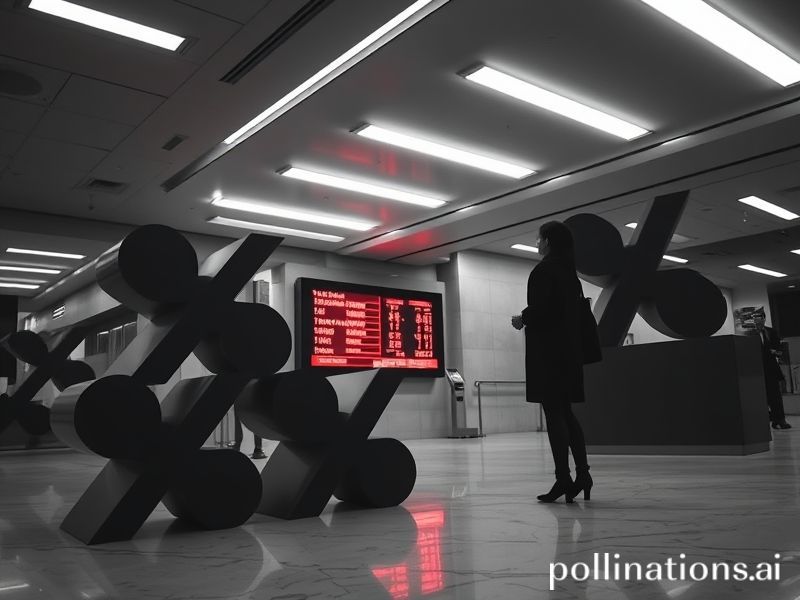Planet Earth Plays Interest-Rate Roulette: Who’s Left Holding the Bill?
Interest Rates: The Global Game of Financial Whack-a-Mole
By Our Man in the Currency Bunker, somewhere between Frankfurt and FOMO
Somewhere on a Bloomberg terminal, a red arrow blinks like a tiny, strobing heart attack. That, dear reader, is the world’s pulse today—set by a committee of twelve serious people in Washington who decide how expensive tomorrow should be. The rest of us simply cope.
From Reykjavik to Rio, interest rates have become the planetary mood ring: green when they’re low (cheap debt, happy TikTok dances), crimson when they’re high (mortgages that resemble ransom notes). The Federal Reserve hiked again this month, the European Central Bank followed with the enthusiasm of a hung-over waiter, and the Bank of Japan—ever the contrarian—kept rates negative, apparently to prove that time travel is possible if you’re sufficiently stubborn.
Emerging markets are caught in the crossfire like extras in a Bond film. Turkey, having already tried the monetary policy equivalent of juggling chainsaws, now watches the lira do interpretive dance. Argentina, never one to miss a fiscal melodrama, raised its policy rate to 97 %, a figure that sounds more like a fever than a yield. Meanwhile, Nigerian banks text customers “Happy Sunday” before politely informing them their naira savings now buy half a yam.
Europe, meanwhile, is rediscovering the charm of compound interest after a decade of negative yields. German savers—once grateful merely not to be charged for the privilege of lending—now earn 3 % on a two-year Bund and behave as if they’ve found Atlantis in the bathtub. Italian homeowners, accustomed to Mario Draghi’s gentle caress, now face mortgages repriced by the full-metal Mario of ECB orthodoxy.
China, ever the courteous superpower, lowered rates to prop up property developers who previously believed concrete was a retirement plan. The People’s Bank of China insists the move is “targeted and prudent,” which in central-bank argot translates to “please don’t panic, but, you know, maybe panic a little.”
In Washington, Jerome Powell’s press conferences have become appointment television for policy nerds and meme lords alike. When he utters the word “data-dependent,” algorithmic traders in Chicago slam espresso while retirees in Florida Google “what is QT again?” The Fed’s balance sheet is shrinking faster than a cheap T-shirt in a hot dryer, and every $95 billion roll-off feels like another brick removed from the speculative Jenga tower.
The broader significance? We are watching the world relearn that money has a price. For fifteen years, capital was essentially free—like tap water at a casino—encouraging everything from crypto yachts to corporate buybacks that resembled insider trading with better catering. Now the bill arrives, laminated and itemized. Higher rates cool inflation, yes, but they also reveal who was swimming naked when the tide of liquidity went out. Spoiler: it’s most of us.
Global South debt, already bloated by pandemic borrowing, now compounds in dollars while export revenues sag. Sri Lanka’s default was last year’s trailer; Ghana and Pakistan queue politely for the sequel. The IMF, that stern but well-meaning dentist, offers “structural adjustment” with the bedside manner of a tax audit.
In the corporate realm, zombie firms—kept technically alive by cheap loans—are finally invited to the morgue. Venture capitalists who once threw term sheets at anything with “AI” in the elevator pitch now clutch pearls at positive cash flow. Even Saudi Arabia’s Public Investment Fund, a desert mirage of $600 billion, is rumored to be Googling “coupon payment.”
And yet, amid the carnage, there is dark comedy. Swiss bankers—who spent decades cultivating discretion—now leak like sieves about which oligarch missed a margin call. British pension funds, having nearly imploded last autumn, lobby for looser rules “just until we’re less levered,” a phrase previously used by toddlers on tricycles.
Conclusion? Interest rates are not merely numbers on a screen; they are the global thermostat, set by unelected technocrats and felt by everyone from Lagos street vendors to Oslo real-estate agents. They punish excess, reward thrift, and remind us that gravity applies to money too. Until the next cycle, keep your seatbelt fastened and your cynicism fully diversified. The red arrow is still blinking.







